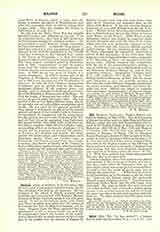

Hillel (Heb. (Hebrew word insert) “he has praised”), a famous Jewish rabbi who lived about 70 B.C.—A.D. 10. Our only source of information concerning him is the Talmud, from which the following account of Hillel’s career can be gathered. He was born in Babylonia, and was a descendant of the family of David. Although he lived in poor circumstances, his zeal for God‘s Law prompted him to devote himself to its study while yet in Babylon. Out of the same zeal, he went, at the age of forty it is said, to Jerusalem, where Shemaiah and Abtalion were at the time the leading teachers. In the Holy City he hired himself as a day-laborer to earn his own living and that of his family, and also to meet the expenses of receiving instruction. He thus spent the next forty years of his life, with the result that he understood, we are told, all languages, including those of the inanimate and of the brute creation, and of the demons themselves. Some time after the death of Shemaiah and Abtalion, Hillel was recognized as the best jurist of the day, and was so regarded during the last forty years of his life. He is also represented as the head of the Sanhedrin with the title of Nasi (prince), as the founder of a lenient school, in usual opposition to the stricter school of Shammai, as the author of seven hermeneutic rules, as the framer of certain decrees which happily accommodated some points of the Law to the changed circumstances of his age, as the ancestor of the patriarchs who stood at the head of Palestinian Judaism till about the fifth century of our era. Hillel was surnamed “the Great”, and also “the Elder”, and over his tomb were uttered the words “Oh the gentle! Oh the pious! Oh the disciple of Esdras!” Several anecdotes illustrating his zeal for the Law and his wonderful patience are embodied in the Talmud. Among the sayings ascribed to him, the following are particularly worthy of notice: “Whatever is hateful to thee, do not unto thy fellow man: this is the whole Law; the rest is mere commentary”; “Be of the disciples of Aaron; loving peace and pursuing peace; loving mankind and bringing them near to the Torah.” It is certain that a good deal of what is contained in the Talmudic account of Hillel’s career is unhistorical; for example, the division of his life into three periods of forty years each; his presidency of the Sanhedrin; his understanding of all languages, etc. When all this has been duly deducted, however, one cannot help feeling that he finds himself in presence of a strong personality, of a character stamped with unusual sweetness and elevation. Again, when all Hillel’s good deeds and wise sayings are closely examined, one can readily see that he was in truth simply a rabbi, perhaps the cleverest and best of the rabbis of his day; a Jewish casuist rather than a deep moralist; a man who, for personal character and spiritual insight and permanent influence, cannot in any way compare with, much less equal or surpass, as some have affirmed of late, Christ, the Light, and Savior of the World. It has been ably argued that the Pollion referred to a few times by Josephus is Hillel under a Greek name.
FRANCIS E. GIGOT

